The AMD Ryzen Threadripper 1950X and 1920X Review: CPUs on Steroids
by Ian Cutress on August 10, 2017 9:00 AM ESTCPU Encoding Tests
One of the interesting elements on modern processors is encoding performance. This includes encryption/decryption, as well as video transcoding from one video format to another. In the encrypt/decrypt scenario, this remains pertinent to on-the-fly encryption of sensitive data - a process by which more modern devices are leaning to for software security. Video transcoding as a tool to adjust the quality, file size and resolution of a video file has boomed in recent years, such as providing the optimum video for devices before consumption, or for game streamers who are wanting to upload the output from their video camera in real-time. As we move into live 3D video, this task will only get more strenuous, and it turns out that the performance of certain algorithms is a function of the input/output of the content.
All of our benchmark results can also be found in our benchmark engine, Bench.
7-Zip 9.2: link
One of the freeware compression tools that offers good scaling performance between processors is 7-Zip. It runs under an open-source licence, is fast, and easy to use tool for power users. We run the benchmark mode via the command line for four loops and take the output score.
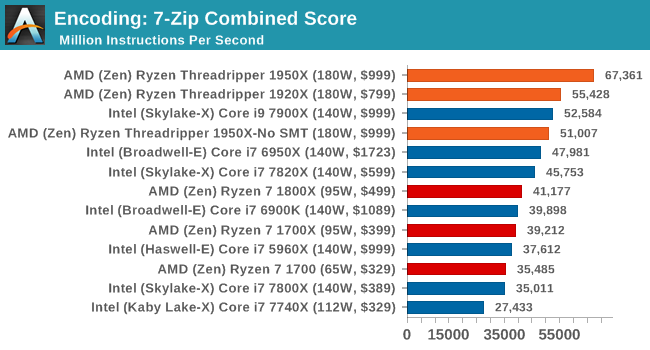
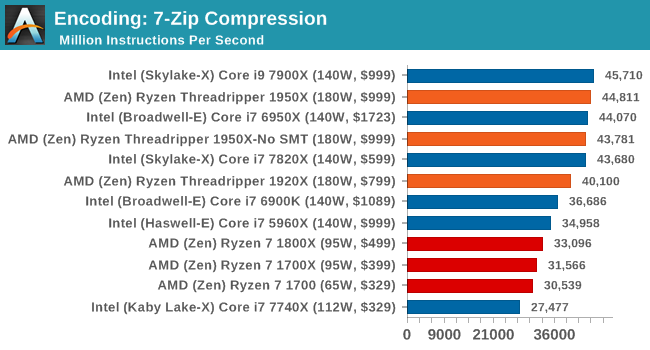
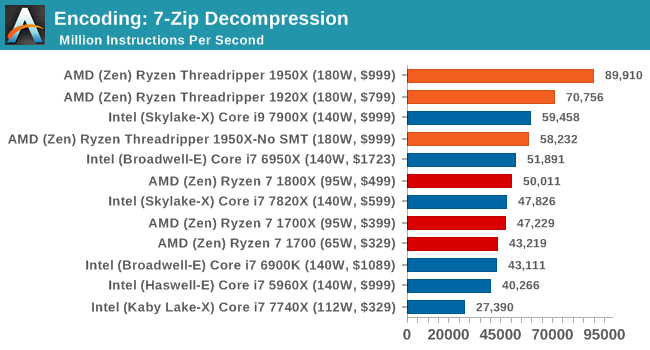
At the request of a few users, we've gone back through our saved benchmark data and pulled out compression/decompression numbers for 7-zip. AMD clearly makes a win here in decompression by a long way.
WinRAR 5.40: link
For the 2017 test suite, we move to the latest version of WinRAR in our compression test. WinRAR in some quarters is more user friendly that 7-Zip, hence its inclusion. Rather than use a benchmark mode as we did with 7-Zip, here we take a set of files representative of a generic stack (33 video files in 1.37 GB, 2834 smaller website files in 370 folders in 150 MB) of compressible and incompressible formats. The results shown are the time taken to encode the file. Due to DRAM caching, we run the test 10 times and take the average of the last five runs when the benchmark is in a steady state.
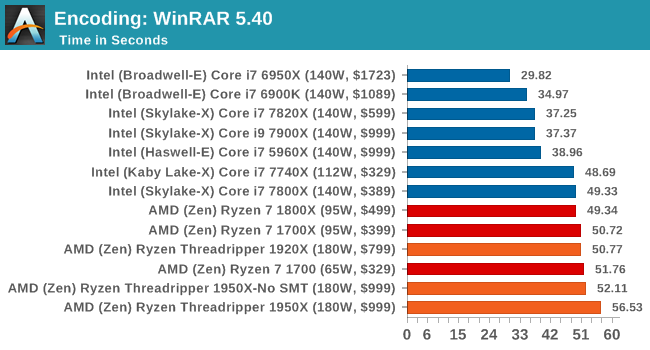
WinRAR encoding is another test that doesn't scale up especially well with thread counts. After only a few threads, most of its MT performance gains have been achieved. Which isn't a help to Threadripper, and is outright a hiderence in Creator Mode.
AES Encoding
Algorithms using AES coding have spread far and wide as a ubiquitous tool for encryption. Again, this is another CPU limited test, and modern CPUs have special AES pathways to accelerate their performance. We often see scaling in both frequency and cores with this benchmark. We use the latest version of TrueCrypt and run its benchmark mode over 1GB of in-DRAM data. Results shown are the GB/s average of encryption and decryption.
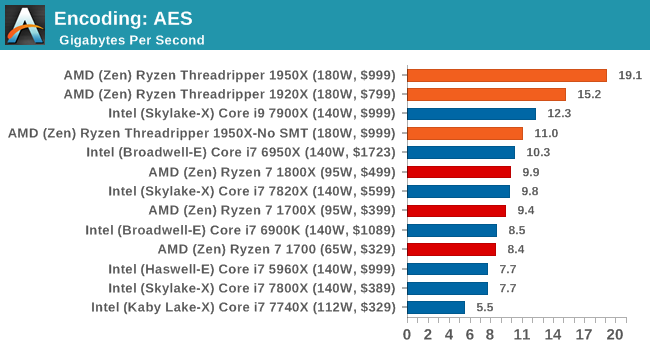
HandBrake v1.0.2 H264 and HEVC: link
As mentioned above, video transcoding (both encode and decode) is a hot topic in performance metrics as more and more content is being created. First consideration is the standard in which the video is encoded, which can be lossless or lossy, trade performance for file-size, trade quality for file-size, or all of the above can increase encoding rates to help accelerate decoding rates. Alongside Google's favorite codec, VP9, there are two others that are taking hold: H264, the older codec, is practically everywhere and is designed to be optimized for 1080p video, and HEVC (or H265) that is aimed to provide the same quality as H264 but at a lower file-size (or better quality for the same size). HEVC is important as 4K is streamed over the air, meaning less bits need to be transferred for the same quality content.
Handbrake is a favored tool for transcoding, and so our test regime takes care of three areas.
Low Quality/Resolution H264: Here we transcode a 640x266 H264 rip of a 2 hour film, and change the encoding from Main profile to High profile, using the very-fast preset.
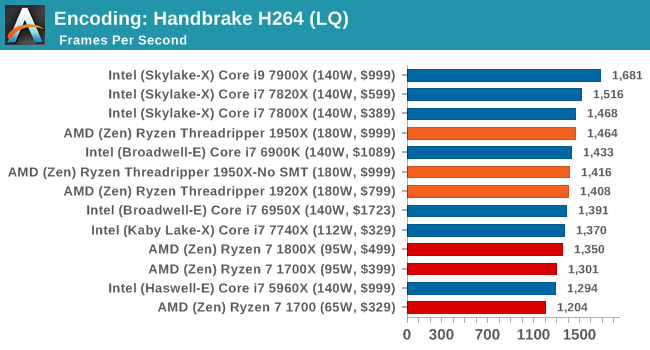
High Quality/Resolution H264: A similar test, but this time we take a ten-minute double 4K (3840x4320) file running at 60 Hz and transcode from Main to High, using the very-fast preset.
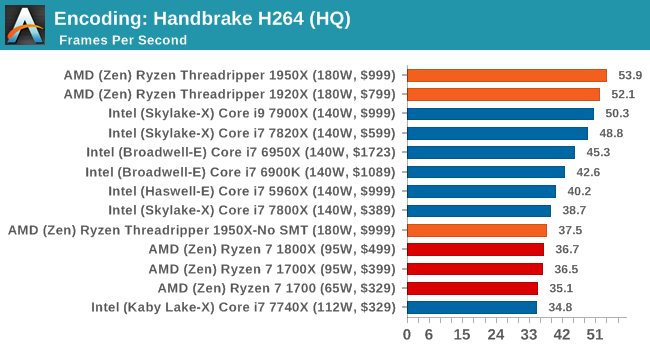
HEVC Test: Using the same video in HQ, we change the resolution and codec of the original video from 4K60 in H264 into 4K60 HEVC.
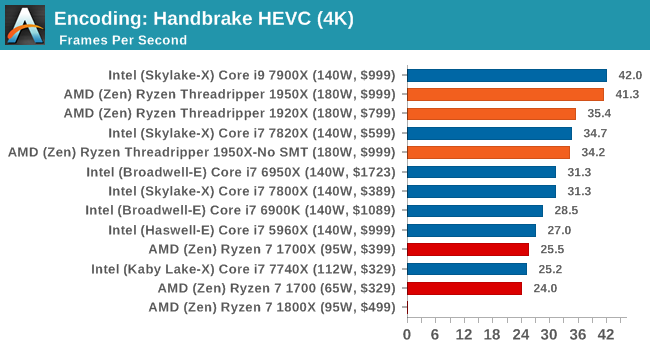
In the HQ H264 test, AMD pushes ahead with both the processors, while SMT-off severely limits the 1950X due to the lack of SMT threads. As we move to HEVC though, the 1950X and 7900X clash on performance.










347 Comments
View All Comments
nitin213 - Thursday, August 10, 2017 - link
Thanks for your reply. Hopefully the test suite can be expanded as Intel's CPUs probably also move to higher core count and IO ranges in future.and i completely understand the frustration trying to get a 3rd party to change their defaults. Cheers
deathBOB - Thursday, August 10, 2017 - link
It's clear to me . . . Ian is playing both sides and making out like a bandit! /sFreckledTrout - Thursday, August 10, 2017 - link
Ian can we get an updated comments section so we can +/- people and after x number of minuses they wont show by default. I'm saying this because some of these comments(the one in this chain included) are not meaningful responces. The comments section is by far the weakest link on Anantech.Nice review btw.
mapesdhs - Thursday, August 10, 2017 - link
toms has that, indeed it's kinda handy for blanking out the trolls. Whether it's any useful indicator of "valid" opinion though, well, that kinda varies. :D (there's nowt to stop the trolls from voting everything under the sun, though one option would be to auto-suspend someone's ability to vote if their own posts get hidden from down voting too often, a hands-off way of slapping the trolls)Given the choice, I'd much rather just be able to *edit* what I've posted than up/down-vote what others have written. I still smile recalling a guy who posted a followup to apologise for the typos in his o.p., but the followup had typos aswell, after which he posted aaaaagh. :D
Ian.
Johan Steyn - Thursday, August 10, 2017 - link
Ian thanks for at least responding, I appreciate it. Please compare your review to sites like PCPer and many others. They have no problem to also point out the weak points of TR, yet clearly understand for what TR was mostly designed and focus properly on it and even though they did not test the 64 PCI lanes as an example, mention that they are planning a follow-up to do it, since it is an important point. You do mention these as well, but could have said more than just mention it by the way.Look at your review, most of it is about games. Are you serious?
I have to give you credit to at least mention the problems with Sysmark.
Let me give you an example of slanted journalism, When you do the rendering benchmarks, where AMD is known to shine, you only mention at each benchmark what they do etc, and fail to mention that AMD clearly beats Intel, even though other sites focus more ons these benchmarks. In the one benchmark where Intel get a descent score, you take time to mention that:
"Though it's interesting just how close the 10-core Core i9-7900X gets in the CPU (C++) test despite a significant core count disadvantage, likely due to a combination of higher IPC and clockspeeds."
Not in one of the rendering benchmarks do you give credit to AMD, yet you found it fitting to end the section of with:
"Intel recently announced that its new 18-core chip scores 3200 on Cinebench R15. That would be an extra 6.7% performance over the Threadripper 1950X for 2x the cost."
Not slanted journalism? At least you mention "2x the cost," but for most this will not defer them in buying the monopoly.
After focussing so much time on game performance, I am not sure you understand TR at all. AMD still has a long way to go in many areas. Why? Because corrupt Intel basically drove them to bankruptcy, but that is a discussion for another day. I lived through those days and experienced it myself.
Maybe I missed it, but where did you discuss the issue of memory speed? You mention in the beginning of memory overclock. Did you test the system running at 3200 or 2666? It is important to note. If you ran at 2666, then you are missing a very important point. Ryzen is known to gain a huge amount with memory speed. You should not regard 3200 as an overclock, since that is what that memory is made for, even if 2666 is standard spec. Most other sites I checked, used it like that. If you did use 3200, don't you think you should mention it?
Why is it that your review ends up meh about TR and leave you rather wanting an i9 an almost all respects, yet most of the other site gives admiration where deserved, even though they have criticism as well. Ian I see that you clearly are disappointed with TR, which is OK, maybe you just like playing games and that is why you are so.
It was clear how much you admire Intel in your previous article. You say that I gave no examples of slanted journalism, maybe you should read my post again. "Most Powerful, Most scalable." It is well known that people don't read the fine print. This was intentional. If not, you are a very unlucky guys for having so many unintended mishaps. Then I truly need to say I am sorry.
For once, please be a bit excited that there is some competition against the monopoly of Intel, or maybe you are also deluded that they became so without any underhanded ways.
By the way, sorry that I called you Anand. I actually wanted to type Anandtech, but left it like it. This site still carries his name and he should still take responsibility. After I posted, I realised I should have just checked the author, so sorry about that.
vanilla_gorilla - Thursday, August 10, 2017 - link
"Intel recently announced that its new 18-core chip scores 3200 on Cinebench R15. That would be an extra 6.7% performance over the Threadripper 1950X for 2x the cost."How do you not understand that is a dig at Intel? He's saying you have to pay twice as much for only a 6.7% improvement.
smilingcrow - Thursday, August 10, 2017 - link
The memory speed approach taken was clearly explained in the test and was stated as being consistent with how they always test.I don't take issue with testing at stock speeds at launch day as running memory out of spec for the system can be evaluated in depth later on.
Johan Steyn - Friday, August 11, 2017 - link
That is just rubbish. Threadripper has no problem with 3200 memory and other sites has no problem running it at that speed. 3200 memory is designed to run 3200, why run it at 2666? There is just no excuse except being paid by Intel.Maybe then you can accuse other sites of being unscientific?
fanofanand - Tuesday, August 15, 2017 - link
Anandtech always tests at JDEC, regardless of the brand.Manch - Friday, August 11, 2017 - link
""Intel recently announced that its new 18-core chip scores 3200 on Cinebench R15. That would be an extra 6.7% performance over the Threadripper 1950X for 2x the cost."Not slanted journalism? At least you mention "2x the cost," but for most this will not defer them in buying the monopoly."
You call Intel the monopoly and call him out for not wording the sentence to dissuade people from buying Intel. Who has the bias here? If he was actively promoting Intel over AMD or vice versa, you'd be OK with the latter, but to do neither. He's an Intel shill? Come on. That's unfair. HOW should he have wrote it so it would satisfy you?
FYI Anand is gone. He's NOT responsible for anything at Anandtech. Are you going to hold Wozniak's feet to the fire for the lack of ports on a Mac too?